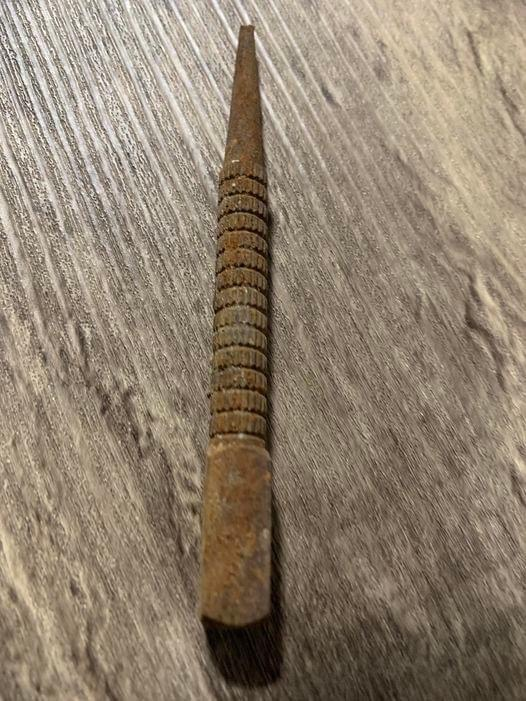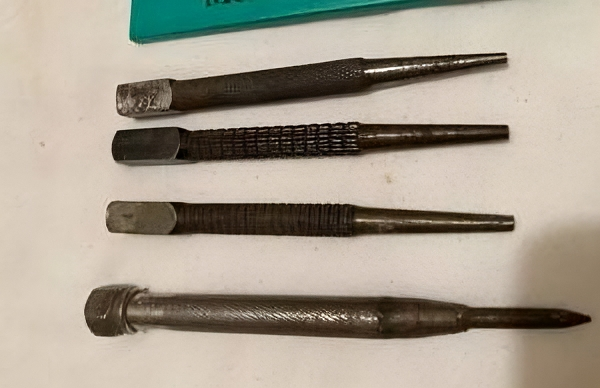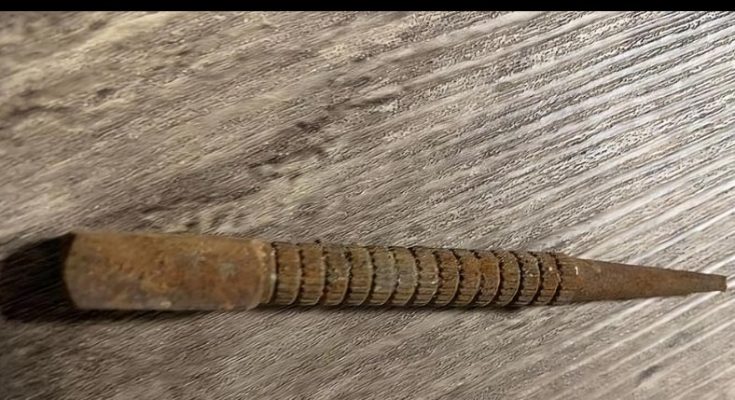Remember those summer afternoons spent in your grandfather’s garage? The air thick with the smell of sawdust, the rhythmic sound of hammering filling the space as tools clanked around the workbench. Among the assorted tools, there was one unassuming yet essential instrument that may have gone unnoticed at the time—the vintage nail punch. This small, often overlooked tool was a staple in any craftsman’s toolbox and played a key role in countless projects. Whether it was building a birdhouse, fixing furniture, or perfecting the finish on a wooden masterpiece, the nail punch was always ready to help deliver that smooth, flawless finish.

A Tool That Shaped Generations of Craftsmanship
For many who grew up in the 1950s through the 1980s, woodworking was not just a hobby—it was part of everyday life. Families often gathered around to tackle projects, from repairing broken furniture to building something new from scratch. Back then, fixing what you had was the norm. The idea of rushing to the store for replacements was foreign; instead, weekends were spent tinkering, repairing, and perfecting. And among the many tools used during those times, the vintage nail punch became a critical element in the art of craftsmanship.
Unlike modern tools designed with convenience in mind, the vintage nail punch was built for precision. This tool allowed woodworkers to drive nail heads below the wood’s surface, leaving a smooth finish that could be easily filled and painted. There was no need for fancy gadgets or laser-guided instruments. The nail punch was simple, effective, and reliable—a tool that did its job well, every time.
What Is a Nail Punch?
For those unfamiliar, a nail punch is a small, pointed tool used to drive the head of a nail below the surface of the wood. This process ensures that no unsightly metal sticks out, providing a seamless finish that can be easily filled with wood putty or painted over. This tool was especially important for detailed work like trim, crown molding, and cabinetry, where aesthetics mattered just as much as function.
The vintage nail punch, in particular, was made to last. Crafted from sturdy steel with a ridged grip, it was designed to withstand years of use. Unlike many modern tools with plastic handles or disposable parts, the vintage nail punch was built with durability in mind—a tool passed down through generations, worn from use but still as reliable as the day it was made.
A Symbol of an Era: When Tools Were Built to Last
The vintage nail punch isn’t just a tool—it’s a symbol of a bygone era where quality craftsmanship was valued above all else. In the mid-20th century, tools weren’t just bought—they were an investment. Families took pride in their collection of tools, many of which were passed down from fathers to sons, grandfathers to grandsons. Every tool, including the nail punch, told a story.
Looking at a vintage nail punch today, you can often see the marks of time: wear from countless projects, a patina that speaks of years of dedicated use, and maybe even a touch of rust that gives it character. These tools weren’t meant to sit on a shelf collecting dust. They were meant to be used, shared, and passed down—tools that embodied the DIY spirit of the time.
The Evolution of Craftsmanship
Over time, as society’s relationship with tools and craftsmanship changed, so too did the tools themselves. Today, we live in a world where convenience often trumps craftsmanship. When something breaks, the instinct is to replace it rather than repair it. We’re more likely to run to a hardware store for the latest high-tech tool than pick up an old favorite from our toolbox.
But for those who appreciate the craftsmanship of the past, the vintage nail punch represents something more. It’s a reminder of the days when fixing things was a source of pride. When every project, whether big or small, was tackled with care and attention to detail. It’s about the satisfaction that comes from working with your hands and seeing a job well done.

Why the Vintage Nail Punch Still Matters Today
For those fortunate enough to have inherited a vintage nail punch or come across one at a flea market, it’s more than just a tool—it’s a connection to the past. Using a vintage nail punch today is like stepping back in time, feeling the weight of history in your hands. Whether you’re restoring an old piece of furniture or working on a DIY home project, picking up that old tool feels like honoring the hands that used it before you.
In a world where mass production and disposable goods dominate, there’s something special about using a tool built to last. It’s a reminder that craftsmanship matters, that taking the time to do something right is still valuable. And while modern tools may make the job quicker, there’s something irreplaceable about the feeling of a vintage tool in your hands.
The Legacy of the Vintage Nail Punch
At the end of the day, the vintage nail punch is more than just a small, pointed tool—it’s a piece of history. It’s a reminder of a time when families gathered to work on projects together, when tools were built with care, and when every item in the toolbox had a purpose. Even today, this humble tool continues to serve its purpose, quietly helping to create smooth, flawless finishes on woodworking projects.
If you’ve ever held one, you know it’s not just a tool—it’s a legacy. Whether it’s been passed down from your grandfather or discovered in an old garage sale, that vintage nail punch tells a story. And as long as it’s in your hands, that story continues.
Conclusion: A Tool That Stands the Test of Time
In today’s fast-paced world, where things are often built for convenience rather than longevity, the vintage nail punch stands as a testament to craftsmanship, tradition, and quality. It may not have been the star of the show in the garage, but it was always there, quietly ensuring that every project was finished with care and precision.
So, if you come across a vintage nail punch—whether in your toolbox, your grandfather’s garage, or at a flea market—don’t dismiss it as just another old tool. It’s a piece of history, a reminder of the value of hard work and craftsmanship. Dust it off, use it in your next project, and remember the hands that held it before you.



